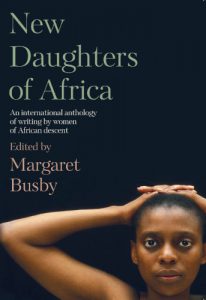In celebration of Women’s Month, The JRB presents a series of excerpts from New Daughters of Africa.

Edited by Margaret Busby, New Daughters of Africa is an anthology of the work of more than 200 women writers of African descent. It follows on from Busby’s seminal 1992 book, Daughters of Africa: An International Anthology of Words and Writings by Women of African Descent from the Ancient Egyptian to the Present.
In the August issue of The JRB, enjoy Danielle Legros Georges’s poem ‘A Stateless Poem’, Afua Hirsch’s essay ‘What Does it Mean to Be African?’, and this excerpt from the much-anticipated English translation of Angolan–Portuguese writer Djaimilia Pereira de Almeida’s debut novel That Hair.
Born in Angola, Djaimilia Pereira de Almeida grew up in Portugal, and lives in the suburbs of Lisbon. She is the author of two novels, Esse cabelo (2015), winner of the Novos Prize 2016 and a finalist of the Casino da Póvoa Prize 2018, and Luanda, Lisboa, Paraíso (2018). Her portrait of a community of people with cerebral palsy, Ajudar a cair, was published in 2017. A graduate of the New University of Lisbon, she has a PhD in Literary Theory from the University of Lisbon. In 2013 she received the Serrote Essay Prize and in 2016 was a finalist of the Rolex Mentor and Protégé Arts Initiative. She is a contributor to the Blog da Companhia das Letras in Brazil, and her writing has appeared in Granta, Granta Portugal, Revista Serrote, Revista Zum, Quatro Cinco Um, Revista Pessoa, Ler, and Words Without Borders. That Hair is forthcoming from Tin House Books in the US in 2020, translated by Eric MB Becker.
Read an excerpt from That Hair:
~~~
My mother cut my hair for the first time when I was six months old. The hair, which according to several witnesses and a few photographs had been soft and straight, was reborn curly and dry. I don’t know if this sums up my still-short life. One could quite easily say just the opposite. To this day, along the curve of my nape, it still grows inexplicably straight, the soft hair of a newborn, which I treat as a vestige. The story of my hair begins with this first haircut. How might I write this story so as to avoid the trap of intolerable frivolity? No one would accuse the biography of an arm of being frivolous; and yet, it’s impossible to tell the story of its fleeting movements—mechanical, irretrievable, lost to oblivion. Perhaps this might sound insensitive to veterans of war or amputees, whose imaginations conjure pains they still feel, rounds of applause, runs along the beach. It wouldn’t do me much good, I imagine, to fantasize over the reconquest of my head by the soft-stranded survivors near the curve of my neck. The truth is that the story of my curly hair intersects with the story of at least two countries and, by extension, the indirect story of the relations among several continents: a geopolitics.
Perhaps the place to begin this biography of my hair is many decades ago, in Luanda, with a girl named Constança, a coy blonde (a fetching ‘typist girl,’ perhaps?), the unspoken youthful passion of my black grandfather, Castro Pinto, long before he became head nurse at Luanda’s Hospital Maria Pia; or perhaps I ought to begin with the night I surprised him with braids that he found divine. I’d spent nine hours sitting cross-legged on the floor at the hairdresser, head between the legs of two particularly brutal young girls, who in the midst of doing my hair interrupted their task to turn some feijoada and rice pudding left over from lunch into a bean soup, and I sensed a warmth on my back (and a vague odor) coming from between their legs. ‘What a sight!’ he said. Indeed: perhaps the story of my hair has its origin in this girl Constança, whom I’m not related to in any way, but whose presence my grandfather seemed to seek in my relaxed hair and in the girls on the bus that, after he was already an old man living on the outskirts of Lisbon, would take him each morning to his job at Cimov where, his back hunched, he swept the floors until the day he died. But how to tell this history with sobriety and the desirable discretion?
‘Perhaps someone has already written a book about hair,’ problem solved, but no one’s written the story of my hair, as I was painfully reminded by two fake blondes to whom I once temporarily surrendered my curls for a hopeless ‘brushing’—two women who, no less brutal than the others, pulled my hair this way and that, commenting aloud ‘it’s full of split-ends’ as they waged battle against their own arms (the masculinity of which, with their swollen biceps bulging from beneath their smocks, was the entire time my secret form of revenge for the torture they inflicted). The haunted house that every hair salon represents for the young woman I am is often all I have left of my connection to Africa and the history of the dignity of my ancestors. However, I have plenty of suffering and corrective brushings after returning home from the ‘beauty parlor,’ as my mother calls it, and of attempts not to take too personally the work of these hairdressers whose implacability and incompetence I never summoned the courage to confront. The story I can tell is a catalog of salons, with Portugal’s corresponding history of ethnic transformations—of the fifty-year-old returnees to the Moldavian manicurists forced to adopt Brazilian methods—undergoing countless treatments to tame the natural exuberance of a young lady who, in the words of these same women, is ‘a good girl.’ The story of surrendering my education in what it meant to be a woman to a public space is not, perhaps, the fairy tale of miscegenation, but it is a story of reparations.
No blonde woman on a city bus ever gave my Grandpa Castro the time of day. Humming bakongo canticles to himself, Papá was the man whom you would never suspect of continuing the time-honored tradition he carries within on our side of the bus; the man of invisible traditions—and what a ring this would have to it capitalized: The Man of Invisible Traditions, an original notion. No one ever looked at him, this man who, by his own account, was rather cranky, ‘the Portuguese kid,’ as he was known as a young man, who was always shouting ‘Put it in the goal, you monkey,’ referring to black soccer players, and who categorised people according to their resemblance to certain jungle animals, even describing himself as ‘the monkey type,’ the kind of person who patiently waits for the conversation to come to a close before proferring his wisdom.
I come from generations of lunatics, which is perhaps a sign that what takes place inside the heads of my ancestors is more important than what goes on around them. The family to whom I owe my hair have described the journey between Portugal and Angola in ships and airplanes over four generations with the nonchalance of frequent fliers. A nonchalance which nonetheless was not passed on to me and throws into stark relief my own dread of trips; a dread that—out of an instinct to cling to life that never assails me on solid ground—I constantly fear will be my last. Legend has it I stepped off the plane in Portugal at the age of three with my hair in a particularly rebellious state, clinging to a package of Maria crackers. I came dressed in a yellow wool camisole that can still be seen today in an old passport photo notable for its wide smile, the product of a felicitous misunderstanding about the significance of being photographed. I’m laughing with joy; or perhaps incited for some comic motive by one of my adult family members, whom I re-encounter tanned and sporting beards in photographs of the newborn me splayed atop the bedsheets.
And meanwhile it’s my hair—and not the mental abyss—that day in and day out brings me back to this story. For as long as I can remember, I’ve woken up with a rebellious mane, so often at odds with my journey, far from the recommended headscarves for covering one’s hair while sleeping. To say that I wake up with a lion’s mane out of carelessness is to say that I wake up every day with at least a modicum of embarrassment or a motive to laugh at myself in the mirror: a motive accompanied by impatience and at times, rage. It’s occurred to me that I might owe the daily reminder of what ties me to my family to the haircut I received at six months of age. I’ve been told I’m a ‘mulata das pedras’, as they say in Angola, not the idealized beauty that ‘mulata’ conjures for them but a second-rate one, and with bad hair to boot. This expression always blinds me with the memory of rocks along the beach: slippery, slimy stones difficult to walk across barefoot.
~~~





